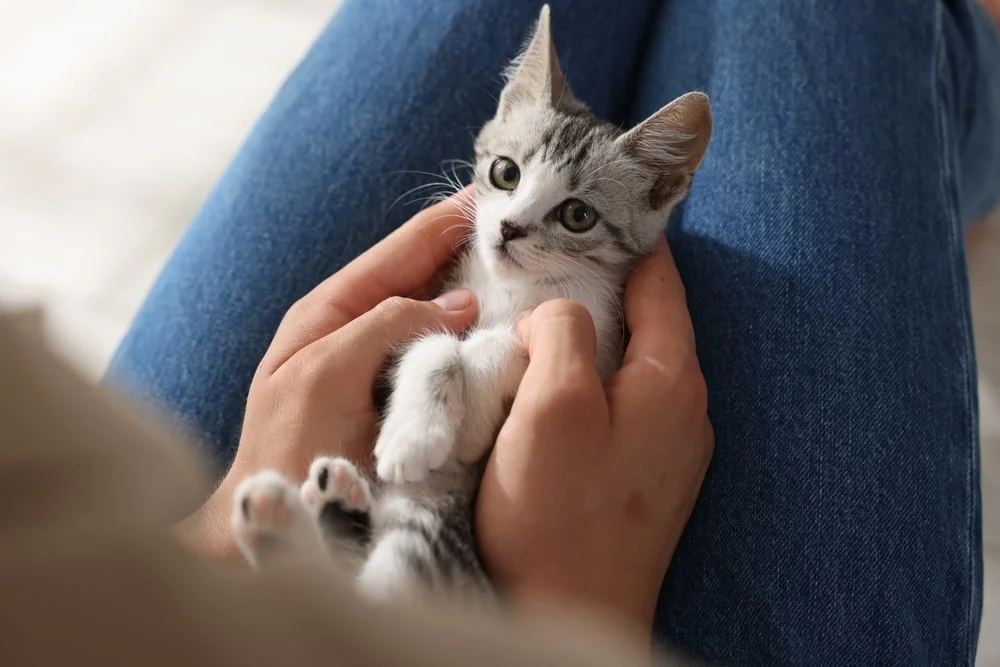PET HEALTH
8 Common Kitten Diseases and Illnesses
You’ve brought a new kitten home, and you’re excited — as you should be! Kittens can be a lot of fun. They’re also a lot of work, and being a pet owner is a big responsibility.
Like any young animal, kittens are vulnerable to several health conditions that could cause serious problems. It’s your job to educate yourself about these kitten diseases so you can recognize the signs and symptoms and get your kitty help, if needed. Here are some of the most common kitten illnesses and health problems and how to deal with them.
Pet Insurance May Help Cover Treatment for Kitten Diseases
Upper Respiratory Infections
Upper respiratory infections usually aren’t serious in adult cats, but they can be fatal in young kittens whose immune systems aren’t as developed.1 These infections are caused by bacteria and viruses, including the feline herpes virus, bordetella bronchiseptica, and feline calicivirus (FCV). The viruses travel via feline saliva (sneezes and coughs), and if a mother cat is sick, she might infect her litter of kittens.
Symptoms include sneezing, coughing, fever, conjunctivitis, and lethargy. If the infection is advanced, you might also observe your kitten refusing to eat or having difficulty breathing. In those cases, it’s imperative to get your cat to the vet as soon as possible.1
Treatment could involve prescription medication based on which virus or bacteria might be causing the infection. Your vet may also ask you to create more humidity in your home. To prevent future infections, make sure your kitten gets the appropriate vaccines, including bordetella and feline calicivirus vaccine, and try to keep them away from other cats.1
Fleas
Fleas are annoying for pet owners to deal with and can cause discomfort for your cat, but they can be dangerous to kittens. Enough flea bites on a kitten can cause anemia, which is a serious condition. Your vet can advise further treatment if your kitten has flea-induced anemia.2
Beyond noticing the little black bugs on your kitten’s skin, if your kitty seems constantly itchy, that’s another telltale sign of fleas. Use a vet-recommended medication or an over-the-counter (OTC) option to treat fleas. You can also remove fleas yourself by combing your kitten’s dampened fur with a flea comb and cleaning all bedding your kitten has used.2
To prevent fleas, regularly dose your kitten with flea prevention medicine, and keep very young kittens indoors.
Ear Mites
Ear mites are common in kittens, and these highly contagious bugs are spread by direct contact from cat to cat. They can also cause other infections and diseases.3
It’s not as easy to spot ear mites as it is other bugs, like fleas. Signs your kitten might have ear mites include ear scratching, head shaking, discharge, rash, hair loss from excessive grooming or scratching, or a blood blister.3
Treatment for ear mites includes topical medication applied in the ears, but your veterinarian will advise you of the best course of treatment.3
Intestinal Parasites
If your kitten is experiencing weight loss, vomiting, diarrhea, coughing, and/or a bloated stomach, they might have some type of parasite infestation. Common intestinal parasites include:4
- Hookworms
- Roundworms
- Tapeworms
- Coccidia
- Giardia
Some of these parasites are worm-like and can burrow into your kitten’s intestine, resulting in failure to thrive. Intestinal parasites can also lead to other bacterial infections and diseases, like anemia, so it’s important to take action if you think your kitten has worms.4
Your vet can deworm your cat regularly, starting when your kitten is 8 weeks old. Since cats can get worms from infected rodents or feces, keeping your kitten indoors means they’re more likely to stay safe.4
Feline Distemper
Feline distemper, also known as feline panleukopenia virus, is a life-threatening and contagious disease that affects a cat’s white blood cells. Kittens have a very high risk of developing this disease, which is spread through feces and bodily fluids. Pregnant cats can also pass it to their kittens in the womb.5
Symptoms of feline distemper often affect the gastrointestinal tract and include loss of appetite, vomiting, diarrhea, dehydration, and fever.5 If your kitten shows any of these symptoms, contact your vet immediately.
The treatment for feline panleukopenia often requires hospitalization as a form of quarantine, and normally antibiotics and fluids are prescribed.5 To protect your kitten, get into a good habit of having them vaccinated against feline distemper.
Feline Leukemia Virus (FelV)
Feline leukemia virus is an incurable disease that affects a cat’s immune system and can cause cancers and blood disorders.6 Kittens are most at risk of catching the virus, largely through transmission during a mother cat’s pregnancy or through the milk while feeding her kittens.
Signs of FelV include persistent fever, diarrhea, weight loss, loss of appetite, gum inflammation, pale gums, and infections throughout the body.6
There’s no cure or specific treatment for feline leukemia virus, and unfortunately, this fatal disease progresses faster in kittens than adult cats. Secondary infections caused by FelV can be treated to help keep a kitten as comfortable as possible.7
Feline Immunodeficiency Virus (FIV)
Feline immunodeficiency virus (FIV), commonly known as "feline AIDS,” is an incurable infectious disease that’s spread primarily through cat bites. Kittens are also at risk because FIV can be passed from a mother cat during pregnancy.8
A kitten with FIV might exhibit a poor appetite, weight loss, seizures, behavioral changes, as well as recurring minor illnesses, urinary tract infections (UTIs), and upper respiratory problems.8
Feline immunodeficiency virus is incurable, so treatment options are limited. Because FIV is similar to human immunodeficiency virus (HIV), some of the same drugs can also be given to FIV-infected cats. It’s important to also treat any secondary illnesses or infections that may develop. Prevention is key to stopping the spread of FIV, so keep your kitten indoors to reduce the likelihood they’ll encounter an infected cat.8
Feline Infectious Peritonitis
Feline Infectious Peritonitis (FIP) is a serious and often fatal disease caused by a mutation of the feline coronavirus (FCoV). While many cats may carry the harmless form of this virus without showing symptoms, in rare cases, it can mutate inside the cat’s body, triggering FIP. This illness can cause widespread inflammation, especially in the kidneys, abdomen, or brain.9
Kittens and young cats are vulnerable to FIP because their immune systems are still developing and may struggle to fight the virus. While there’s no guaranteed way to prevent FIP, reducing exposure to large groups of cats and maintaining a low-stress environment can help lower risk.9
Prevention and Care for Common Kitten Health Problems
It may not be possible to protect your kitten from every health issue, but there are steps you can take to help prevent them and properly care for your cat in the event they do get sick.
- Keep them indoors. If you let your kitten roam outdoors without supervision, they’re more likely to come into contact with certain parasites or other cats infected with viruses, like FIV.8
- Get them vaccinated. Staying up to date with vaccinations can help protect your kitty from infectious diseases, like feline distemper and FCV.
- Keep a clean environment. To help reduce the chances of infectious diseases spreading, regularly cleaning your kitten’s food and water bowls, bedding, and litter boxes is important.
- Prioritize parasite prevention. Flea and tick prevention, along with de-worming treatments, can save your pet discomfort down the road. MetLife Pet’s Preventive Care plan can help provide coverage for proactive care like this.
- Pay attention. Being aware of the symptoms for some of these common kitten diseases means you can seek veterinary care as quickly as possible if necessary, giving your kitten the best chance at a healthy, happy life.
MetLife Pet May Help Cover Common Kitten Diseases
No one wants to think about their kitty being sick, but preparing for kitten health problems is part of responsible pet ownership. If you’re interested in seeing how cat insurance through MetLife Pet can help reimburse you for routine care, treatment for kitten diseases, and vaccinations with our Preventive Care plan, get a free quote today.



